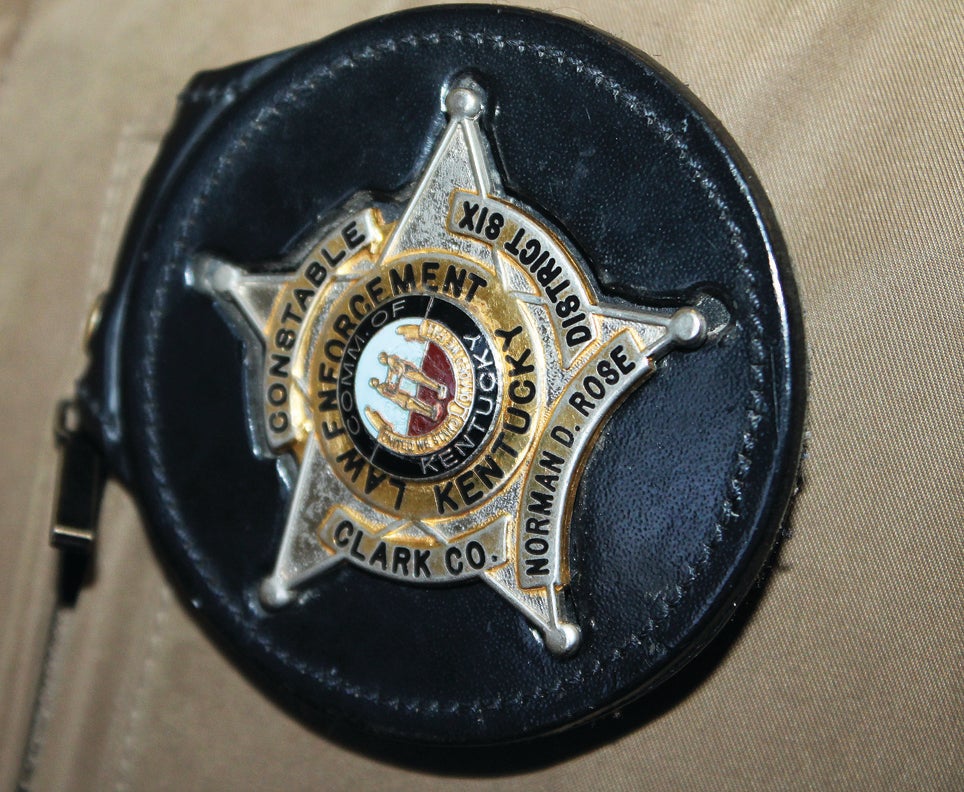Closer Look: Constables fill a niche in county government
Published 9:53 am Monday, March 11, 2019
In November 2018, Clark County voters elected six constables on the general ballot.
Though the position has been around for centuries, and in Kentucky since 1850, constables are misunderstood by many.
They are constitutional officials with full arrest powers and county-wide jurisdiction. They are not paid but collect fees by serving documents for the court system.
Trending
They are not required to be trained or certified like police officers, but there are opportunities available for training at their expense. Constables also furnish their own equipment including vehicles, firearms, uniforms and expenses.
A bill before the Kentucky House of Representatives to limit constables’ authority brought the office back to the forefront recently as to what the role of the office is in today’s society.
Duties and authorities
In Kentucky, constables are one of four elected positions with arrest powers and law enforcement authority, including the sheriff, coroner and jailer.
The qualifications to run for constable are the same as the sheriff under state law. Candidates must be 24 years old, a Kentucky citizen for two years and a resident of the particular district for one year prior to the election.
They are also required to post a bond of at least $10,000, which is approved by the county fiscal court.
Trending
While the position is not paid, constables collect fees for serving court documents and other duties, including shooting mad dogs, according to state statute.
History
Historically, Kentucky constables have served the court system through serving civil papers including warrants, subpoenas and summonses.
According to a report published by the Kentucky Department of Criminal Justice Training in 2012, the position was created as part of Kentucky’s 1850 constitution. Each district within a county elected a justice of the peace. A constable would assist the justice in that district, but had countywide jurisdiction.
When Kentucky revamped its judicial system in 1975 to create district and circuit courts, constables were not addressed but the position continued. In Clark County, today’s constables say they primarily serve the court system and serve court documents, whether for the court or for private attorneys.
Legislation
Through the years, there have been a number of bills filed in the Kentucky General Assembly to alter the duties of constables, either eliminating or broadening their law enforcement capabilities, through the years.
This year, House Bill 214 was filed which would allow counties to grant arrest powers to certified constables, allow the county clerk or fiscal court to retain up to 25 percent of fees collected by constables, to allow the use of blue lights if approved by the local fiscal court and remove constables from the definition of peace officers, among others. It would also direct the service of court papers to the sheriff’s office first. The bill was later amended to apply those provisions only to counties with 75,000 or more population beginning Jan. 1, 2023.
Because Clark County’s population is well below the threshold, if it passed it likely would have no effect in Clark County. State Rep. Les Yates (R-Winchester) said it appears unlikely the bill will come to a floor vote, because the session is nearly over and there are bigger issues including school safety and the state pension situation.
“It’s doubtful it will come to the floor for a vote,” Yates said Friday.
According to the DOCJT report, two bills to abolish constables, through a constitutional amendment, were filed in 2012, but were not approved by the Kentucky General Assembly.
Law enforcement
Clark County presently has six constables, five of which began their first term in January. The sixth, sixth district constable Doug Rose, just began his second term.
None of the six have had to use their arrest powers or law enforcement authority, they said.
“We want to do it right,” fourth district constable David Puckett said. “I hope I never have to arrest anyone.”
Rose said constables can also detain a person until police or sheriff’s deputies arrive, which works almost as well, he said.
Third district constable Lynn Toler said some of the new constables are still waiting for FBI-issued agency numbers needed to fill out arrest citations.
Rose said he’s not had to arrest anyone, but having the authority to do so could keep situations from escalating and offer a measure of safety.
“I think if (HB 214 passed) and we didn’t have that power, it would make it more dangerous for the constables to do their work,” Rose said.
Constables often enter emotional situations to serve documents, including evictions and child custody orders.
“Depending on the person, it can turn from a civil (situation) to a criminal one in a heartbeat,” Rose said. “If they want to assault me and know I didn’t have that (arrest) power, it would make these situations more dangerous.”
Clark County Jailer Frank Doyle said constables have served documents on prisoners already being held in the jail, but he was not aware of any constables bringing in new arrests.
The report generated by DOCJT in 2012 surveyed hundreds of sheriffs, police chiefs, county attorneys, judge-executives and Kentucky State Police officials about whether constables were an essential part of modern law enforcement. The majority of respondents were in favor of abolishing the office as it had little role in law enforcement.
The report did not touch on other duties of constables.
Training
The constitution does not require constables or sheriffs to be trained in law enforcement. Police officers in Kentucky are required to complete state police academy training, which lasts 26 weeks.
The Kentucky Constables Association offers a 50-hour training course, held over two weekends, for new constables, which Puckett said they paid for out of their own pockets.
“It’s not that we say, ‘Great. We don’t have to get training,’” Puckett said. “We want to present ourselves as professionals.”
Courses include gun qualifications, serving papers, how to make arrests and defensive tactics, among many other topics.
“We do not want to be a liability,” first district constable Doug Woodall said. “We want to be an asset. We have a lot to lose if we come across as a hot dog.”
Among Clark County’s constables, Rose served in the military during Vietnam, Woodall is a retired police officer and Toler served as a special deputy in Clark County. Fifth district constable Jerry Edwards has a background in fire and EMS, and second district constable Brad Wells has a degree in criminal justice but works in information technology to support his family. Puckett has always had an interest in law enforcement.
Service
Rose said he believes serving court papers actually relieves some of the workload from the sheriff’s office and city police.
“That’s something very important but not as flashy,” Wells said. “We have the time to go and hunt people down or make three or four attempts (to serve them).”
Woodall said he sees himself as someone able to help law enforcement or other first responders, but is not necessarily looking for people committing crimes.
“If I see something, I’ll immediately call for the sheriff’s department or police department for backup,” he said. “If I have to intervene, I will and I have the training. We’re not principal law enforcement, but the secondary, assisting arm of law enforcement.”
Clark County’s constables formed their own association and meet at least once a month to discuss situations and issues.
“We need to be held accountable,” Puckett said.
“We always to always be professional,” Edwards said.








